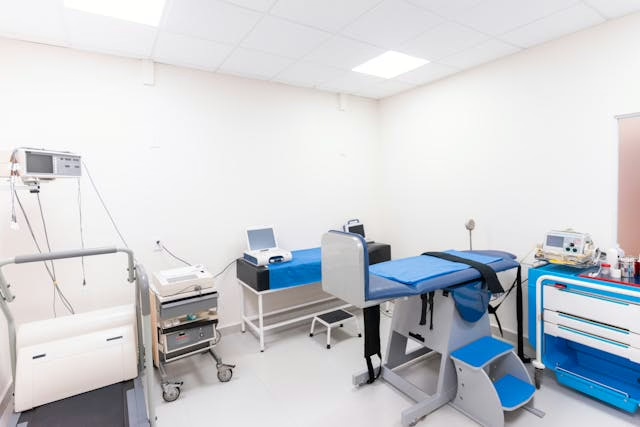Mental health conditions can vary in severity, with some individuals requiring intensive and structured care to stabilize and regain control over their well-being. For those experiencing severe depression, anxiety, psychotic disorders, or co-occurring substance use disorders, an Inpatient Treatment Program offers the comprehensive support and medical supervision needed to begin long-term recovery.
At Greater Boston Behavioral Health, we provide structured inpatient treatment services to help individuals achieve stability and build a strong foundation for mental wellness. Our programs include individual therapy, group counseling, medication management, and evidence-based approaches such as DBT Therapy and CBT Therapy.
In this in-depth guide, we explore the importance of inpatient treatment, its role in long-term recovery, and how it provides the critical care individuals need to heal and transition back into daily life successfully.
What is Inpatient Treatment?
Inpatient mental health treatment is a highly structured program where individuals receive 24/7 medical care, therapy, and psychiatric support in a safe and controlled environment. This level of care is designed for individuals who:
- Struggle with severe depression, anxiety, bipolar disorder, PTSD, or schizophrenia.
- Are experiencing suicidal thoughts or self-harming behaviors.
- Need intensive therapy and medication management to regain stability.
- Have co-occurring disorders, such as substance use and mental health conditions.
- Have experienced multiple relapses after outpatient treatment.
Inpatient treatment removes the daily stressors and distractions of life, allowing individuals to focus entirely on their mental health recovery.
The Importance of Inpatient Treatment for Long-Term Mental Health Recovery
1. Provides a Safe and Structured Environment
One of the greatest benefits of inpatient treatment is that it offers a secure and supportive setting where individuals can receive stabilization and crisis intervention.
How Inpatient Treatment Creates a Safe Environment:
- 24/7 psychiatric care and medical monitoring for individuals in crisis.
- A controlled space free from outside stressors and potential triggers.
- Immediate intervention for individuals at risk of self-harm or suicide.
For individuals struggling with severe mental health conditions, inpatient care provides the first step toward long-term healing.
2. Intensive Therapeutic Support for Emotional Healing
Unlike outpatient programs, inpatient treatment provides daily, structured therapy sessions to address the root causes of mental health struggles.
Evidence-Based Therapies Used in Inpatient Treatment:
- CBT Therapy – Helps individuals identify and change negative thought patterns.
- DBT Therapy– Focuses on emotional regulation, distress tolerance, and mindfulness.
- Trauma Therapy Programs – Provides support for individuals dealing with PTSD and past traumatic experiences.
- Group Therapy Programs – Encourages peer support and shared healing.
- Family Therapy Programs – Helps rebuild relationships and improve communication.
Through consistent and focused therapy, individuals learn coping skills, emotional regulation strategies, and self-awareness techniques to manage their mental health effectively.
3. Medication Management and Psychiatric Care
For many individuals, medication plays a key role in stabilizing symptoms and improving overall mental health. However, proper medication management requires expert oversight to ensure effectiveness.
Benefits of Medication Management in Inpatient Treatment:
- Proper prescription and adjustments based on an individual’s symptoms and needs.
- Regular monitoring of side effects to ensure safety and effectiveness.
- Combination of therapy and medication to optimize mental health recovery.
At Greater Boston Behavioral Health, our psychiatrists and medical professionals work closely with patients to determine the right medication plan for their recovery journey.
4. Helps Individuals Develop Healthy Coping Mechanisms
Many individuals enter inpatient treatment with unhealthy coping strategies such as substance use, avoidance, or self-harm behaviors.
Inpatient therapy focuses on:
- Teaching stress management techniques to handle anxiety and emotional distress.
- Encouraging self-care routines that promote emotional well-being.
- Helping individuals develop problem-solving skills for daily life challenges.
By the time individuals transition into outpatient care, they are equipped with the tools needed for sustainable recovery.
5. Reduces the Risk of Relapse and Hospitalization
One of the biggest challenges individuals face after mental health treatment is preventing relapse. Inpatient treatment provides intensive stabilization that significantly reduces the risk of:
- Rehospitalization due to recurring crises.
- Relapse into unhealthy behaviors or substance use.
- Social withdrawal and isolation after leaving treatment.
How Inpatient Care Prevents Relapse:
- Teaches early warning signs of relapse and how to manage them.
- Provides aftercare planning to ensure ongoing support.
- Helps individuals transition into lower levels of care for continued treatment.
At Greater Boston Behavioral Health, we focus on long-term recovery planning to help individuals maintain mental and emotional stability beyond inpatient treatment.
Who Needs Inpatient Mental Health Treatment?
Inpatient treatment is ideal for individuals who:
- Struggle with suicidal ideation, self-harm, or severe depression.
- Have psychotic symptoms, including hallucinations or delusions.
- Have attempted outpatient treatment but continue to experience severe distress.
- Are unable to function in daily life due to mental health struggles.
- Have a history of repeated hospitalizations or relapses.
Seeking inpatient treatment is not a sign of weakness—it is a powerful step toward healing and long-term recovery.
Transitioning from Inpatient Treatment to Long-Term Recovery
Mental health recovery is a journey, and inpatient care is just the first step toward stability. To support lasting wellness, individuals often step down into structured outpatient care.
Step 1: Partial Hospitalization Program (PHP)
- Provides structured therapy sessions during the day while allowing individuals to return home at night.
- Includes psychiatric care, medication management, and individual therapy.
Step 2: Intensive Outpatient Program (IOP)
- Offers flexible, part-time therapy to help individuals reintegrate into daily life.
- Focuses on building coping strategies and preventing relapse.
Step 3: Outpatient Therapy and Support Groups
- Weekly therapy sessions to address ongoing mental health challenges.
- Encouragement through peer support groups to maintain recovery momentum.
At Greater Boston Behavioral Health, we offer personalized recovery plans that ensure a smooth transition from inpatient to outpatient treatment.
Why Choose Greater Boston Behavioral Health for Inpatient Treatment?
At Greater Boston Behavioral Health, we provide comprehensive inpatient mental health treatment that focuses on stabilization, healing, and long-term recovery.
What Sets Our Inpatient Treatment Apart?
- 24/7 psychiatric care and crisis intervention for individuals in distress.
- Customized treatment plans tailored to each person’s mental health needs.
- Evidence-based therapies including CBT Therapy, DBT Therapy, and trauma-informed care.
- Seamless transition to outpatient programs for ongoing recovery support.
If you or a loved one is struggling with a mental health crisis, inpatient treatment can provide the stability needed to begin the path to healing.
Call Greater Boston Behavioral Health at (888)278-0716 to learn more about our Inpatient Treatment Program and Mental Health Therapy Programs in Boston. Take the first step toward lasting recovery today.
FAQ on Role of Inpatient Treatment in Mental Health Recovery
What is inpatient mental health treatment?
Inpatient treatment is an intensive, 24/7 residential care program for individuals experiencing severe mental health conditions. It provides medical supervision, therapy, medication management, and crisis intervention in a structured environment.
Who should consider inpatient treatment?
Inpatient treatment is recommended for individuals who:
- Are experiencing severe depression, anxiety, PTSD, or bipolar disorder.
- Have suicidal thoughts, self-harming behaviors, or psychotic symptoms.
- Have struggled with relapse despite outpatient treatment.
- Need intensive therapy and medication management to regain stability.
What therapies are included in inpatient mental health treatment?
- Cognitive Behavioral Therapy (CBT Therapy) for managing negative thoughts.
- Dialectical Behavior Therapy (DBT Therapy) for emotional regulation.
- Group and Family Therapy Programs for interpersonal support.
- Trauma Therapy Programs for individuals recovering from PTSD and past trauma.
How does inpatient treatment support long-term recovery?
Inpatient care provides stabilization, coping strategies, medication management, and relapse prevention tools. It also ensures a smooth transition into outpatient care, such as Partial Hospitalization Programs (PHP) and Intensive Outpatient Programs (IOP), for continued support.
How long does inpatient treatment last?
The length of inpatient treatment varies based on the individual’s needs, typically ranging from a few weeks to several months. The goal is to stabilize symptoms and develop a long-term recovery plan.
What happens after inpatient treatment?
After inpatient care, individuals often transition to:
- Partial Hospitalization Programs (PHP) for structured day treatment.
- Intensive Outpatient Programs (IOP) for continued therapy while reintegrating into daily life.
- Outpatient therapy and support groups for long-term mental wellness.
How can I get started with inpatient treatment at Greater Boston Behavioral Health?
Call (888)278-0716 to speak with a mental health professional and learn more about our Inpatient Treatment Program and Mental Health Therapy Programs in Boston.


